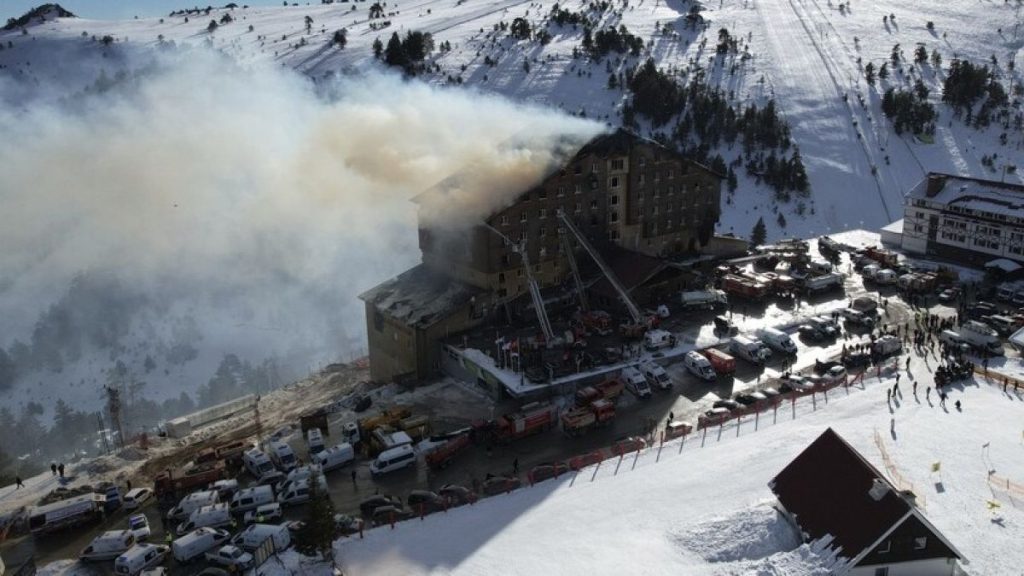The Grand Kartal hotel fire, a devastating tragedy that unfolded at the popular Kartalkaya ski resort in Bolu, Turkey, claimed the lives of at least 76 people, leaving a nation in mourning. The 12-story hotel, packed with guests enjoying the two-week winter school break, became engulfed in flames in the early hours of the morning, trapping many inside. Desperate attempts to escape the inferno led some to jump from the upper floors, adding to the grim toll. Beyond the confirmed fatalities, over 50 individuals suffered injuries, ranging from minor burns to critical conditions requiring extensive medical care.
The fire, believed to have originated in the hotel’s restaurant section, rapidly spread throughout the building, fueled by what some witnesses suspect was the wooden cladding on the exterior. The speed and intensity of the blaze raised immediate concerns about the hotel’s fire safety measures. Guests reported a chaotic scene with screams filling the air as people searched frantically for escape routes. Some recounted using bedsheets in desperate attempts to climb down the building’s exterior, while others bravely assisted fellow guests to safety amidst thick smoke and encroaching flames. The fire detection system’s apparent failure to activate further exacerbated the crisis, hindering early warning and evacuation efforts.
Turkish authorities swiftly launched an investigation into the incident, detaining nine individuals, including the hotel owner, for questioning. Six prosecutors were appointed to lead the probe, underscoring the government’s commitment to uncovering the cause of the tragedy and holding those responsible accountable. Interior Minister Ali Yerlikaya vowed that justice would be served, while President Recep Tayyip Erdogan declared a national day of mourning, ordering flags at government buildings and diplomatic missions to be flown at half-staff. The nation grappled with the immense loss of life and the harrowing details of the victims’ final moments.
The tragedy brought to light critical questions surrounding the hotel’s adherence to fire safety regulations. While Turkish Tourism Minister Mehmet Nuri Ersoy stated that the hotel had passed fire safety inspections in both 2021 and 2024, survivors’ accounts and the rapid spread of the fire cast doubt on the efficacy of these inspections. The delay in the fire department’s response, attributed by officials to the hotel’s location on the side of a cliff, further compounded the disaster, hindering rescue efforts and potentially contributing to the high casualty count.
The identification of the victims proved to be a challenging task, with authorities working tirelessly to match remains with families anxiously awaiting news. The heartbreaking process of returning the identified bodies to their loved ones began as the nation mourned the collective loss. The survivors, many of whom witnessed horrific scenes of desperation and suffering, faced the difficult road to physical and emotional recovery. The stories of their escape, filled with fear, bravery, and the will to survive, painted a stark picture of the nightmarish events that unfolded within the burning hotel.
The Grand Kartal hotel fire serves as a stark reminder of the vital importance of stringent fire safety regulations and their rigorous enforcement. The tragedy underscored the need for robust fire detection and suppression systems, clear evacuation plans, and readily accessible escape routes. As the investigation continues, the nation awaits answers, seeking accountability and demanding measures to prevent such a devastating event from ever happening again. The memory of the victims and the lessons learned from this tragedy will undoubtedly shape future fire safety practices in Turkey and beyond.














